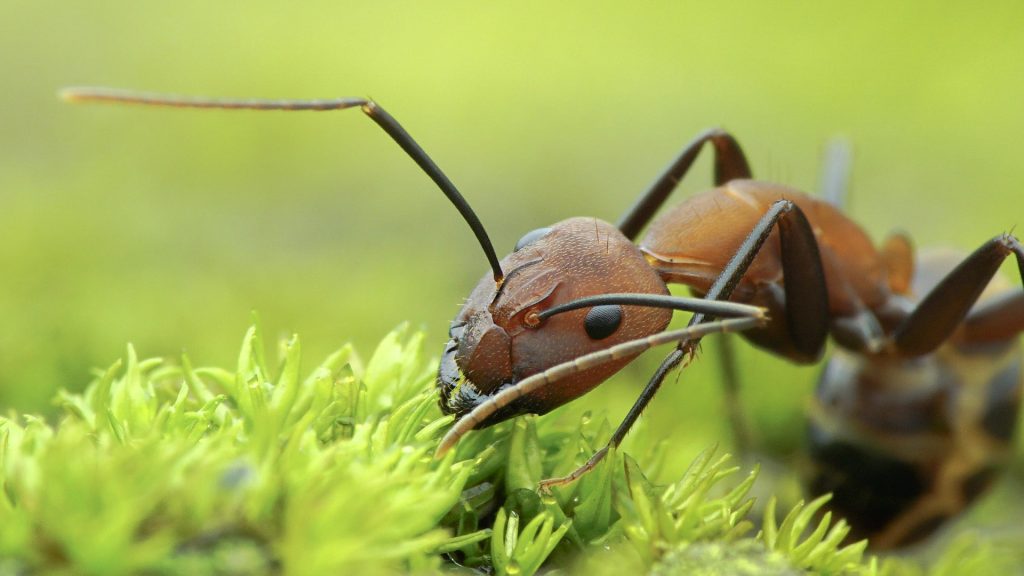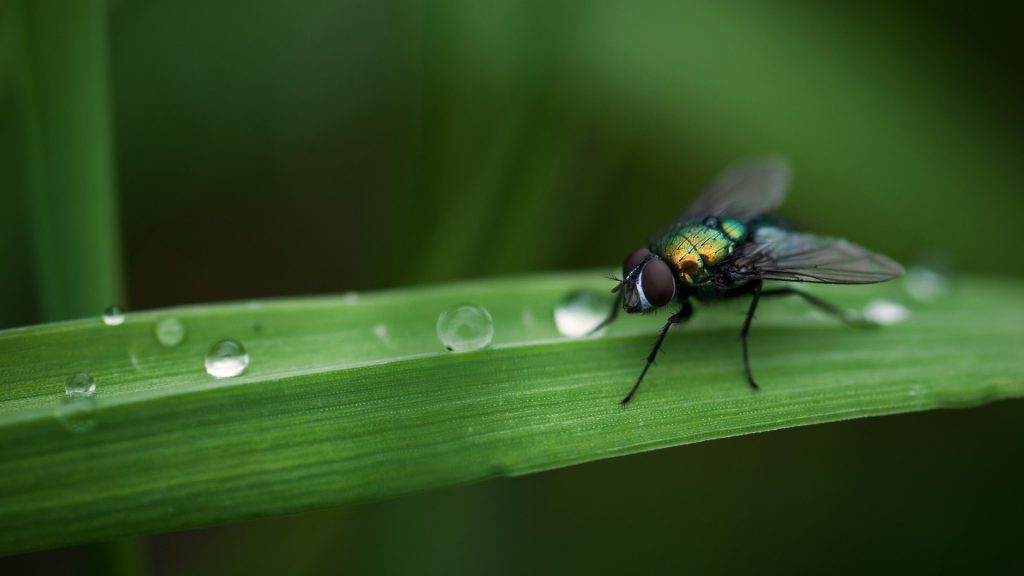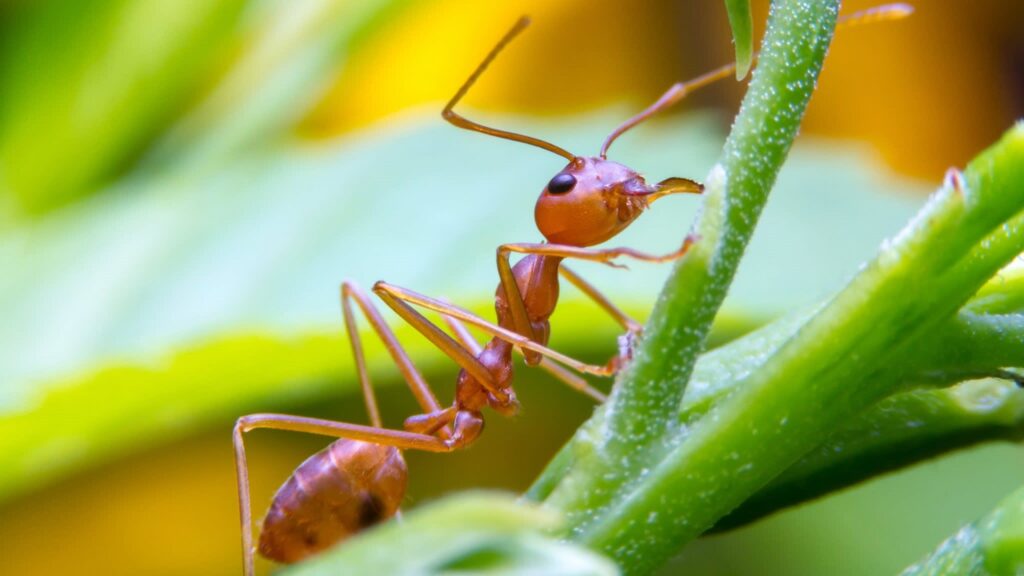
The Simple Way to Get Rid of Ants In Your Lawn
Nothing ruins a relaxing day in your backyard quicker than an ant attack and these territorial beings aren’t afraid to let you know that you’re invading their space.
Although small, these little insects can have a ferocious bite and might make your lawn somewhere you fear to go, rather than enjoy.
How do you get rid of ants on your lawn? There are a number of chemical treatments you can use to kill and deter ants if you decide to remove them completely. Otherwise, homemade solutions like vinegar and water solutions can help deter them from returning to your lawn.
If you’re looking for ants in lawn treatment that will keep the biting insects at bay, we can help. This guide covers everything from natural and chemical treatments as well as looking at the role ants play in your backyard.
Why Are There Ants in My Lawn?
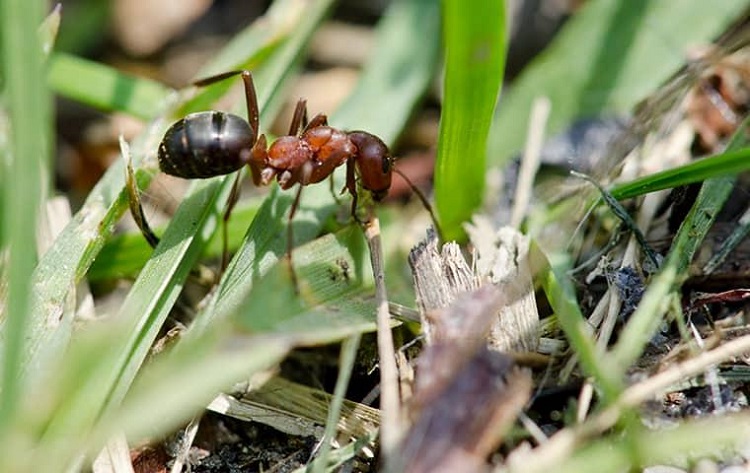
Once you’ve spotted some ants in your yard, there’s a good chance they’re everywhere, even if you can’t see them.
However, just because you see these insects on the lawn doesn’t always mean it’s a bad thing and if it’s just a few, you might be able to leave them be.
Ants are part of the balanced ecosystem that exists within our lawns and gardens and they can be helpful in breaking down plants and any dead insects that might be sitting around.
Once they do, the waste is carried underneath the soil and into the nest, which decomposes and fertilizes your lawn. Although helpful, they can also be a hindrance and will attack if they feel threatened.
These insects will usually arrive if your lawn is in poor health so the best thing you can do to prevent an invasion is to take care of your grass.
Other times, you might notice a lot of ant nests after it’s been raining as they take this chance to dig up their nest to try and dry the soil out.
Can Ants Damage My Garden?

The presence of ants in lawn and garden settings is enough to worry anyone, and not just because of their bites.
Some ant species are capable of doing serious damage to your grass and all of your hard gardening work which is why you need to take action as soon as you see them crawling around.
Depending on the species of ant and how they build their nests, the most common issue occurs when the soil that they excavate pushes up onto the grass.
As it covers the lawn, it limits sun exposure, and the grass underneath will start to brown and die off. The excess dirt can also become muddy and make a mess of your lawn, ruining all of your hard work.
Another issue is that these compromised areas are more vulnerable to weed growth, so not only are you dealing with an ant infestation but also a weed problem.
The weeds and the ant hill create patches and mounds, so a task as simple as mowing becomes more challenging because of the uneven ground.
Finally, the issue of ant bites can be enough to put you off from entering your garden or enjoying your lawn. If you have pets and kids, even more so, and the luscious lawn you worked so hard to achieve will be wasted if nobody can use it.
Do You Need to Call the Professionals?

Ants are no stranger to lawns and as their natural habitat, it’s usual to see some crawling around and even the odd ant mound.
If you’re worried about the ants getting out of control though, you can call in a pest expert to assess the property and make recommendations about eradicating them.
The signs that should be of concern are noticing more than a few ant mounds around your lawn, as well as dry and dead patches of grass where these mounds are close by.
This usually indicates that the ant infestation has gotten out of control and there are likely many nests underneath the ground.
A trained pest removal expert will be able to identify the type of ant that’s taken over your lawn and come up with a plan to treat them.
They usually work with pesticides and termiticides to do this job, and then come back at a later date for another application and to assess how the infestation is going.
Natural vs Chemical Treatments: Which is Best?
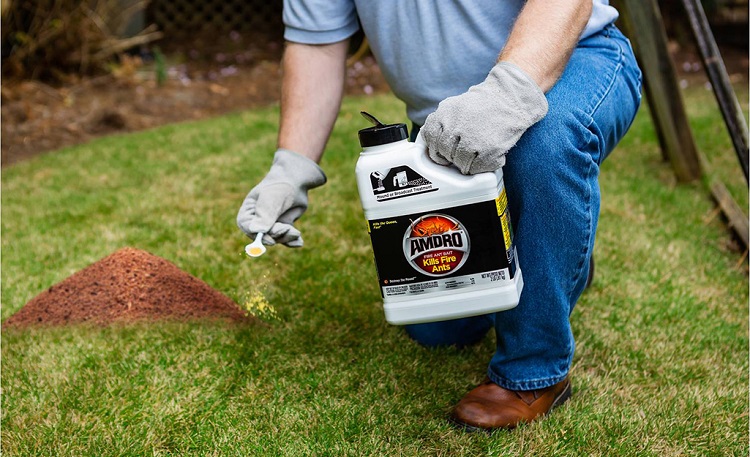
One of the biggest debates in gardening, and not just when dealing with insect infestations, is whether you should be using natural ingredients or chemicals.
For ants specifically, there are two schools of thought that are the same, and there are pros and cons that each side has to consider.
If you do decide to use natural treatment, like a home remedy vinegar and water solution, it can be effective, but usually won’t yield instant results as harsher chemicals do.
However, you’ll feel peace of mind that you didn’t spray anything poisonous onto your lawn and that you’re moving the ants along in a gentler way.
For some, the natural approach isn’t enough, and they prefer the reliable but harsh alternative of using chemicals like pesticides.
While they do kill the ants instantly and effectively, you then have to worry about the damage these chemicals are doing to your lawn and potentially the children and pets that play on them.
Common Chemical Treatments
Whether you decide to go the professional route or treat the ants yourself with some harsher chemicals, there are a few ways to do it.
These are the types of chemical treatments that may be effective in eradicating them and how they work.
- Barrier treatment: This is usually applied as a spray around the barrier of where the ants are invading, and is commonly used at doorways and windows of houses but can work outside as well. While the barrier works initially and can remove colonies from your yard, it’s not a long term solution for keeping ants away.
- Contact treatment: A contact spray or treatment is applied directly to the ants and insects and will kill them almost immediately. Although effective in eradicating the ants on top of the ground, it doesn’t focus on the colonies that are in the nests underneath, and so they can keep emerging afterward.
- Nest treatments: These pesticides don’t kill the ants right away but infects them as if it was a virus, which means they retreat back to their nest. While there, they spread more of the product to the other ants in the nest, and eventually, the chain reaction kills off large colonies of the insects. These treatments can last for many years, although they are more expensive to perform.
- Bait treatments: Operating similarly to the nest treatment, this type of chemical is placed into a form of bait that ants are attracted to. As they carry back the “food” to their nest to share with the colony, they’re ensuring that all of the ants ingest the poison as well, which aims to kill them all, including the ones underground.
DIY and Home Remedies
If you’d prefer not to use any chemicals or hire any experts to treat your ant problem, you can use the wisdom of others before you try some home remedies.
Here are a few proven methods for keeping ants off of your lawn:
- Vinegar and water: The easiest solution is to mix three parts white vinegar and one part water, then place the solution into a spray bottle. Spray it around the yard including on top of the ant mounds and anywhere else you want to keep them away from. The vinegar will prevent them from finding their nest or leaving it.
- Cinnamon: Use a stronger form of Saigon cinnamon and sprinkle some around the ant hills and mounds, or wherever you see their trails. Not only will it kill the ants and repel them from returning, but it’s a gentle and non-toxic option that smells good as well. If you have cinnamon essential oil, the concentrated formula can be even more effective.
- Mint: If ants are a problem in your garden beds as well as your lawn, some carefully planted mint can help. Ants and other insects don’t like the aroma of mint and will do their best to stay away from it. This gentle approach means the ants aren’t killed but simply deterred, and it gives you some of the fresh herb to enjoy as well.
- Boric acid: Boric acid, related to Borax, can be found at most home improvement stores. Although not entirely natural and still dangerous around pets and animals, it’s an easy home remedy you can use. Boric acid can be mixed with cornmeal or peanut paste as a way to lure ants in, and once ingested they will die off.
How to Prevent Ants From Returning
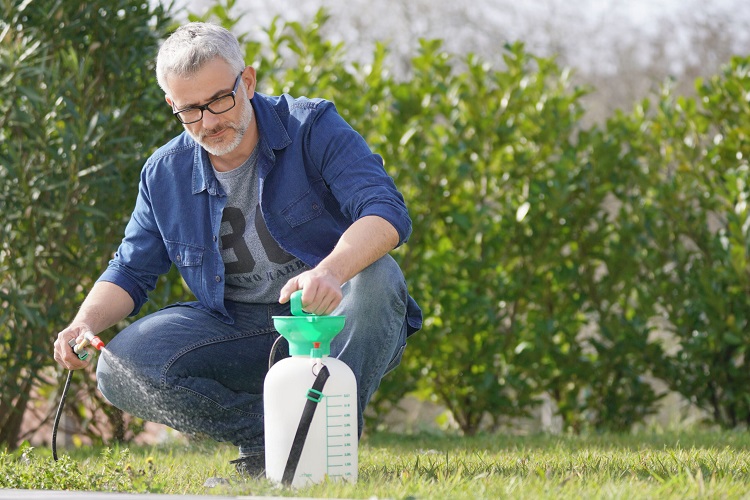
Once you’ve completed the hard task of getting rid of the ants, you’ll want to make sure they don’t come back.
The easiest way to do this, and prevent other pests from invading your lawn, is to keep it in good shape. Use mulch and compost, fertilize the lawn, aerate and dethatch it, and mow it regularly, all of which can help.
You’ll also want a reliable brand of pesticides that you can use if you spot them returning. Otherwise, having a home remedy using natural ingredients can remove them before they get out of hand.
This will deter the ants from returning but also give you peace of mind that your pets and children can play freely on the lawn without being exposed to any harsh chemicals.
In some cases, the ants returning might not be all bad, as long as they don’t take over your yard again or are an ant species that you need to be concerned about.
As part of the ecosystem of your lawn, ants can offer some benefits, so consider whether they’re worth keeping around before you try to get rid of them completely.
Getting the Ants Away
Ants are a normal part of the vast ecosystem that makes up your backyard, but when they’re creating huge mounds or hurting the people that live there, they have to go.
With natural and chemical options for treating them available, you can get rid of your ant problem once and for all and reclaim your lawn once again.
Related Questions
There are a number of insects, pests, and weeds that attempt to take over our lawns and gardens, so being prepared for them before they get out of control is the best defense we have.
Read on for a few commonly asked questions about these intruders that can help you get equipped to keep them away.
How Do You Get Rid of Pests in Soil?
Pests are commonly found in soil and can be removed or killed using a number of methods. The best approach is to change the soil completely, apply compost and mulch on top, and limit the amount of soil disturbance.
Monitoring your garden and lawn will ensure you get on top of these infestations before they get out of hand.
What Kind of Weeds Are Growing in My Grass?
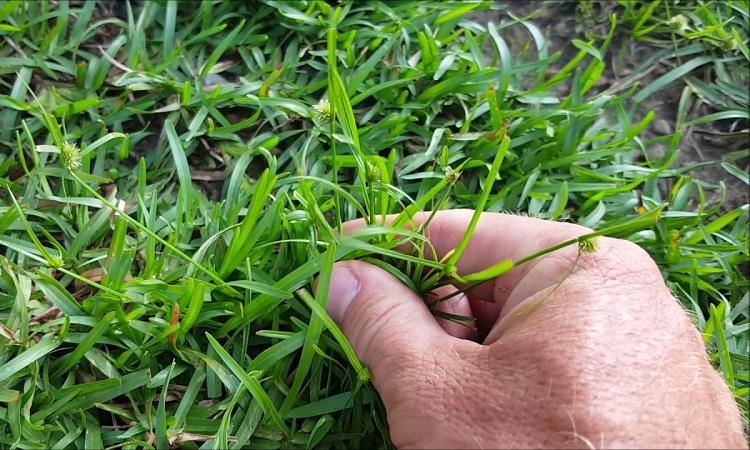
Weeds can grow in all of the common grass and lawn types which is why a pre-emergent herbicide is recommended to keep them away.
The usual suspects for weeds are crabgrass, moss, nutsedge, dandelions, quack grass, and bindweed, most of which can be treated with a standard herbicide.
Can You Kill Weeds Naturally?
There are a few home remedies for killing weeds including pouring boiling water on them, splashing vinegar, or spraying them with a combination of dish soap and water.
Some weeds react differently than others so you may want to get a few options prepared for treating the ones on your lawn.
Resources:
